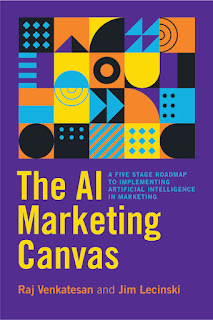 |
| Source: Stanford University Press |
It's easy to find e-books, white papers, and articles discussing the role of AI in marketing, and there are dozens of books dealing with the technical aspects of artificial intelligence and the social and cultural ramifications of AI.
There are far fewer full-length books that provide a detailed treatment of how AI can be used to support marketing decisions and enable more productive marketing programs. For that reason, I looked forward to reading The AI Marketing Canvas: A Five-Stage Road Map to Implementing Artificial Intelligence in Marketing (Stanford University Press, 2021).
This book was written by Raj Venkatesan, a professor of business administration at the University of Virginia's Darden Graduate School of Business Administration, and Jim Lecinski, a clinical associate professor of marketing at Northwestern University's Kellogg School of Management.
What the Book Covers
The AI Marketing Canvas includes four major sections.
Part 1 (Chapters 1-3) - This section lays out the authors' point of view on the importance of artificial intelligence in marketing and provides an overview of the book's content. Venkatesan and Lecinski state their position on AI in explicit terms at the beginning of Chapter 2. They write:
"In this new economy . . . we believe there is one way and one way only to win, and that is with AI and machine learning - developed against a rock-solid marketing strategy . . . These strategies also need to be driven by marketing leaders whose obsession is to find ways to use AI and machine learning to personalize the customer relationship at every juncture." (Emphasis in original)
Part 2 (Chapters 4-6) - Chapter 4 discusses the emergence and power of "network" business models (e.g. Amazon, Google) that are enabled by technology platforms. In Chapter 5, the authors describe their four-stage customer relationship model (acquisition - retention - growth - advocacy), and they review the three "waves" of marketing (mass-segmented marketing, data-driven marketing and one-to-one personalized marketing). Chapter 6 explains some of the basic concepts and uses of artificial intelligence and machine learning.
Part 3 (Chapters 7-13) - This part contains the core of the book's content. In Chapter 7, the authors introduce the AI marketing canvas, and then they devote a chapter chapter to a discussion of each "stage" of the canvas framework.
The AI marketing canvas is primarily a matrix created by the four customer relationship components ("moments") and a five-stage AI maturity model that includes foundation, experimentation, expansion, transformation and monetization. According to the authors, companies that achieve a high level of success with AI in marketing will move through most of these five stages of AI maturity.
Part 4 (Chapters 14-16) - The final section of The AI Marketing Canvas provides guidance for implementing the concepts discussed in the previous portions of the book. Venkatesan and Lecinski adopt John Kotter's change management model from his 1996 book Leading Change, and they argue that changes will be needed across four organizational dimensions - people, process, culture and profit - to maximize the impact of AI in marketing.
The authors conclude their book with an unambiguous "call to action" for marketers and marketing leaders. They write: "To be a successful marketer in the coming years, you must decide now whether you will engage and become an expert in AI marketing, or sit on the sidelines and watch the 'AI bus' pass you by - or worse, run you over."
My Take
The AI Marketing Canvas is an ambitious book that, for me, doesn't quite live up to its promise. The authors expressly state that the mission of their book is to provide ". . . a road map you can use to build an effective marketing plan - one that accounts for all that is required to effectively apply AI and machine learning to your marketing - so you can win"
Rather than a detailed "road map," the book is more like an impressionist painting than a close-up photograph. It addresses most of the important issues, but it doesn't contain enough detail to be called a "how-to" manual.
That being said, The AI Marketing Canvas provides some valuable information for marketers who are novices when it comes to artificial intelligence. For example, Chapter 6 is a good introduction to AI and machine learning, but marketers will need to learn a little more to have a good working knowledge of AI and ML.
Another particularly valuable part of the book is Chapter 8, which discusses the digital infrastructure required to collect and process the customer-related data that is necessary to feed AI applications. Providers of AI-enabled software applications typically emphasize the powerful capabilities of their solutions, but they don't talk as much about the volume or quality of data that's required for those capabilities to perform as intended.
Put simply, the output produced by an AI application will only be as good or reliable as the quality of the data it uses to generate that output. In Chapter 8 of the book, the authors emphasize that building a robust data infrastructure is the first essential step in implementing AI in marketing, and that this process doesn't end. Starbucks is one of the companies featured in The AI Marketing Canvas, and the authors note that Starbucks has been developing its data collection and AI capabilities for over ten years.
Artificial intelligence is already an integral part of marketing at many larger enterprises, and the use of AI in marketing is destined to become more widespread in the near future. The AI Marketing Canvas is a worthwhile resource for marketers who are just starting to learn about artificial intelligence. If you already have a basic understanding of how AI works and how it can be used in marketing, other resources will be more useful.




No comments:
Post a Comment